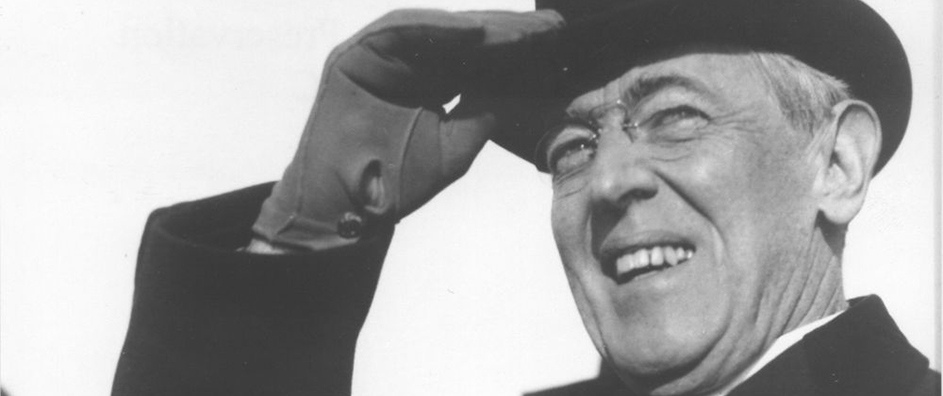The views expressed in our content reflect individual perspectives and do not represent the authoritative views of the Baha'i Faith.
As to President Wilson, the fourteen principles which he hath enunciated are mostly found in the teachings of Baha’u’llah and I therefore hope that he will be confirmed and assisted. Now is the dawn of universal peace; my hope is that its morn will fully break, converting the gloom of war, of strife and of wrangling among men into the light of union, of harmony and of affection. – Abdu’l-Baha, Selections from the Writings of Abdu’l-Baha, pp. 311-312.
President Woodrow Wilson’s Fourteen Points formed a new political blueprint for world peace. He first elucidated them on January 8, 1918, in a speech on the aims of war and the terms of a universal peace. In this essay, let’s take a closer look at points one through five, the chiefly diplomatic terms Wilson proposed, and compare them to the Baha’i teachings:
1. Open covenants of peace, openly arrived at, after which there shall be no private international understandings of any kind but diplomacy shall proceed always frankly and in the public view.
Ahead of his time, Wilson advocated transparency in diplomatic efforts toward one goal: Peace. So did the Baha’i teachings:
…day by day strengthen the bond of love and amity to this end, — that they may become the sympathetic embodiment of one nation. — That they may extend themselves to a Universal Brotherhood to guard and protect the interests and rights of all the nations of the East, — that they may unfurl the Divine Banner of justice, — that they may treat each nation as a family composed of the individual children of God and may know that before the sight of God the rights of all are equal. – Abdu’l-Baha, Abdu’l-Baha in London, p. 122.
In the second and third points, Wilson called for freedom of movement and trade around the globe:
2. Absolute freedom of navigation upon the seas, outside territorial waters, alike in peace and in war, except as the seas may be closed in whole or in part by international action for the enforcement of international covenants.
3. The removal, so far as possible, of all economic barriers and the establishment of an equality of trade conditions among all the nations consenting to the peace and associating themselves for its maintenance.
Freedom of the seas, vitally important in an age before regular air flights, highlighted the growing interdependence of all peoples on mutual trade, travel and interchange. The Baha’i teachings recognized that interdependence long before:
All the members of the human family, whether peoples or governments, cities or villages, have become increasingly interdependent. For none is self-sufficiency any longer possible in as much as political ties unite all peoples and nations, and the bonds of trade and industry, of agriculture and education, are being strengthened every day. Hence the unity of all mankind can in this day be achieved. – Baha’u’llah, Baha’u’llah and the New Era, Dr. J. E. Esselmont, p. 249.
Next, Wilson proposed a deep reduction in armaments:
4. Adequate guarantees were given and taken that national armaments will be reduced to the lowest point consistent with domestic safety.
Baha’u’llah made this proposal more than half a century before, in his letters to the world’s kings and rulers:
Tread ye the path of justice, for this, verily, is the straight path. Compose your differences, and reduce your armaments, that the burden of your expenditures may be lightened, and that your minds and hearts may be tranquilized. Heal the dissensions that divide you, and ye will no longer be in need of any armaments except what the protection of your cities and territories demandeth. – Gleanings from the Writings of Baha’u’llah, p. 251.
In his fifth point, President Wilson made a valiant attempt to end the scourge of colonialism:
5. A free, open-minded, and absolutely impartial adjustment of all colonial claims, based upon a strict observance of the principle that in determining all such questions of sovereignty the interests of the populations concerned must have equal weight with the equitable claims of the government whose title is to be determined.
Abdu’l-Baha, who recognized the negative impact of colonization on prospects for international peace, also spoke out for the principle of self-determination and the extinction of the old colonial model:
First, the nations are rivals with each other so far as commercial advantages are concerned. Second, they are thinking of the national self-aggrandizement. Third, they are thinking of planting new colonies. Therefore, it is difficult for them to step into this field, to uphold international peace, because they are contending, warlike, victory-loving people. They cannot be instrumental in promulgating international peace. – Abdu’l-Baha, Star of the West, Volume 4, p. 167.
’Unity in freedom’ has today, of course, become a universal aspiration of the Earth’s inhabitants. Among the chief developments giving substance to it, [Abdu’l-Baha] may well have had in mind the dramatic extinction of colonialism and the consequent rise of self-determination as a dominant feature of national identity at century’s end. – Century of Light, The Universal House of Justice.
Next, in Wilson’s sixth through thirteenth points, he called for a final settlement of the territorial and border-dispute issues in Russia, Belgium, France, Alsace-Lorraine, Italy, Austro-Hungary, the Balkans, Poland and Turkey and the Ottoman Empire. The Baha’i teachings concur that borders and boundaries should be finally determined, and recommend what would become the basis for the eventual union of all nations in one great assemblage:
In this all-embracing Pact the limits and frontiers of each and every nation should be clearly fixed, the principles underlying the relations of governments towards one another definitely laid down, and all international agreements and obligations ascertained. In like manner, the size of the armaments of every government should be strictly limited, for if the preparations for war and the military forces of any nation should be allowed to increase, they will arouse the suspicion of others. The fundamental principle underlying this solemn Pact should be so fixed that if any government later violate any one of its provisions, all the governments on earth should arise to reduce it to utter submission, nay the human race as a whole should resolve, with every power at its disposal, to destroy that government. Should this greatest of all remedies be applied to the sick body of the world, it will assuredly recover from its ills and will remain eternally safe and secure. – Abdu’l-Baha, The Secret of Divine Civilization, p. 64.
Next: The Fourteenth Point: How to Create a Peaceful World
















Comments
Sign in or create an account
Continue with Googleor